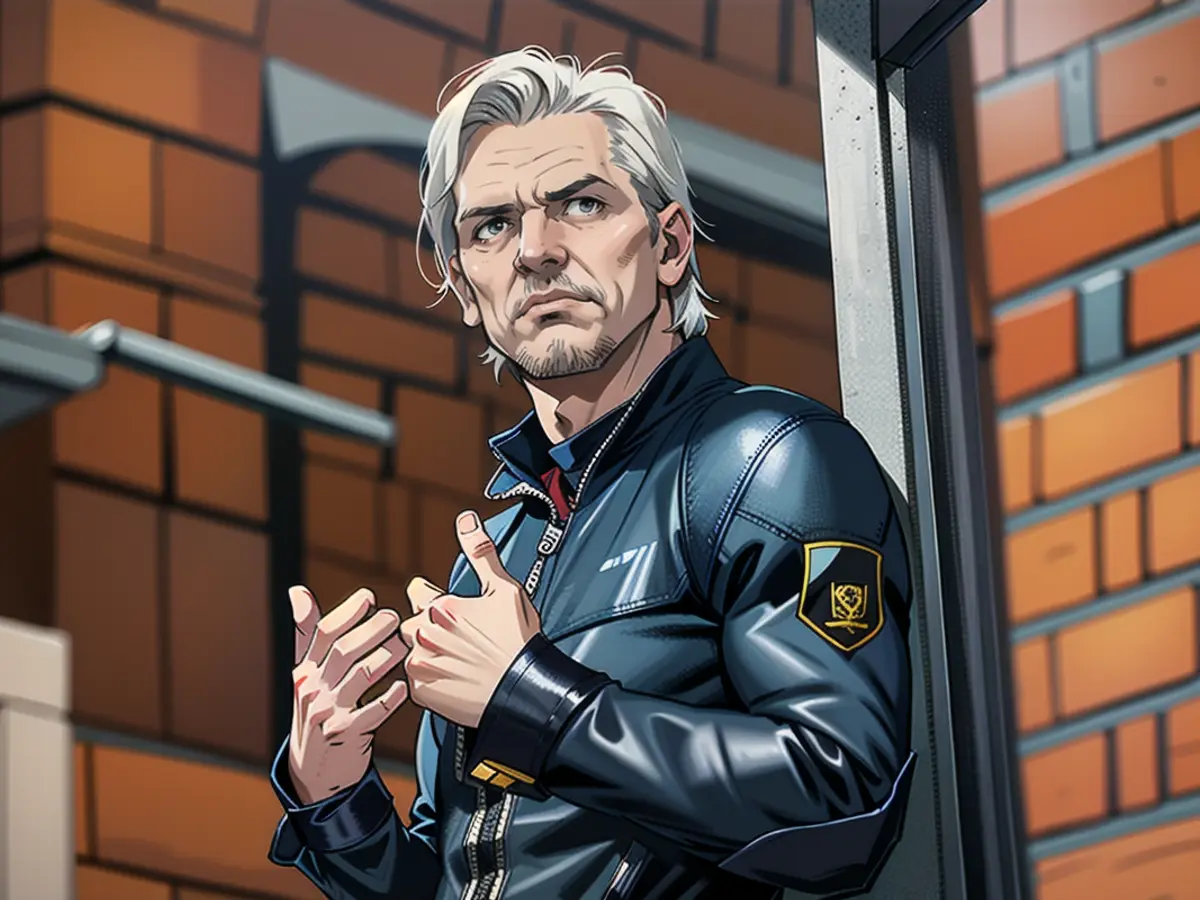Numerous Ukrainians are currently detained in Russian jails. Ukraine argues that they're being used as tools for negotiation.
Scribbled on a small scrap of paper, this is the sole communication Halyna and Vasyl Khyliuk have received from their son Dmytro Khyliuk, nicknamed Dima, since he was snatched by Russian soldiers about two years ago.
The Ukrainian reporter was apprehended in March 2022 when the Russian army occupied his village of Kozarovychi, just north of Kyiv. All Halyna and Vasyl know is that the 49-year-old journalist for the Ukrainian Independent Information Agency is allegedly being held in Russian custody, though there are no official charges or convictions against him, according to his lawyer.
The Ukrainian administration affirms there are thousands of people like Dima, ordinary folk detained by the Russians who have been detained without cause for decades. Kyiv has acknowledged close to 1,700 such instances, but human rights investigators estimate the actual number is five to seven times greater. In total, approximately 37,000 Ukrainians – civilians, children, and military personnel – are unaccounted for, according to the Ukrainian Ombudsperson's Office, which notes that people continue to be apprehended in regions under Russian control. CNN can't independently verify the number of detainees.
Many of those held have been relocated to prisons deep within Russia, alongside criminals and prisoners of war, in violation of international humanitarian law. Human rights organizations have discovered over a hundred detention facilities across Russia and occupied Ukrainian territory where civilians are being incarcerated, including several established specifically to accommodate them.
"The Russians want to consider many of them as military combatants and categorize them as prisoners of war ... The main reason being (to create) a reservoir of POWs for exchanges," Ukraine's Human Rights Commissioner, Dmytro Lubinets, told CNN in Kyiv. Lubinets noted that classifying Ukrainian civilians as prisoners of war would be both unlawful and risky, as it would raise the likelihood of more Ukrainian civilians being captured and turned into bargaining chips.
"These individuals are not prisoners of war; they are civilian hostages. I use that term to emphasize what the Russian Federation is doing – they are confining civilians as hostages," he added. Per the Geneva Conventions, hostage-taking is prohibited. It's permissible for combatants to arrest people, including civilians. However, the criteria for detention, the motivation behind it, and the duration are all stringent.
"The rule is that it is not a punishment," explained Achille Després from the Kyiv branch of the International Committee of the Red Cross (ICRC). He added that civilians can only be detained if it's "necessary" for "imperative reasons of security."
The Ukrainian administration and various international organizations claim that Russia is committing war crimes by keeping people like Dima in custody. Concerns over Russia's arbitrary detention of Ukrainian civilians are so severe that 45 members of the Organization for Security and Co-operation in Europe (OSCE) initiated a special inquiry in February to devise strategies for holding Russia accountable.
Desperate search
CNN spoke to the Khyliuks at their home in Kozarovychi, which has since been liberated and revamped by Ukrainian volunteers. They recounted the terror of their son's capture and the anxiety of not knowing whether he'd ever return.
In the early weeks of the war, Russian troops took over their property, parking a tank in the garden and looting valuable items. The Khyliuks were taking refuge at a neighbor's house, occasionally venturing out to gather essentials. One such outing caused them to encounter a group of Russian soldiers with machine guns.
"They put some kind of jackets over our heads and taped our eyes, so we couldn't see anything. Dima and I were separated. A week later, they transported us to Dymer. We endured two nights there together. It was frigid, the floor was concrete, and it was unheated. I was clad in a winter jacket, but Dima was wearing a light jacket and galoshes," Vasyl, who was freed after eight days, recollected.
When they didn't reappear, Halyna said she was distraught, knowing the Russians must have detained them. "They snatched plenty of people during that period, they nabbed whoever they encountered. Those they didn't desire, they tortured slightly and then released. But Dima and six other individuals have been incarcerated for two years," she wept.
Russia has turned into a vacuum for information, forcing Ukrainian family members, authorities, and non-governmental organizations (NGOs) to rely on hearsay from former prisoners to learn about those still detained.
Anastasiia Pantielieieva, a researcher and journalist who documents cases of civilian detentions and involuntary disappearances for the Media Initiative for Human Rights (MIHR), a Ukrainian NGO, said that, based on first-hand testimonies, Dima was in two improvised detention facilities in occupied Ukraine before being sent to a pre-trial detention center in Novozybkov, located in Russia's Bryansk region.
She mentioned that the last witness to see Dima was at Penal Colony Number 7 in Russia's Vladimir region. At some point, MIHR received indication that he might be transferred to another facility in Mordovia, but Pantielieieva stated that Russian authorities never confirmed this information.
Russia has consistently denied holding Dima despite various reports placing him in Russian detention centers. The Russian Investigative Committee and the Prison Service in Bryansk both informed Dima's lawyer in December 2022 and January 2023 that he was not in Russia and had no information about him.
Dima's handwritten note was dated April 2022, but his parents only received it in August that same year. Later, in May 2023, the ICRC contacted the Khyliuks to confirm their son was still alive. However, it wasn't until this March, two years after his arrest, that the Russian Ministry of Defense acknowledged Dima had been detained and was being kept in Russia. They did not provide any details about his whereabouts or condition.
"We've had instances where even those who are put on trial, have their cases in the public eye, with photographs from the courtroom, and still the relatives have no official documentation or confirmation that these individuals are indeed on Russian territory," said Pantielieieva.
According to international humanitarian law, during times of conflict, the ICRC has the right to visit prisoners to ensure they're being treated reasonably and to reconnect them with their families. The prisoners must also know the reason for their incarceration and have an opportunity to contest their detention.
Ukrainian Defense Intelligence suspects that the FSB and the Russian National Guard are driving the arrests and detentions of Ukrainian civilians. Neither agency responded to CNN's requests for comment.
CNN made several attempts to acquire information from Russian defense, interior ministries, the Russian ombudsman's office, the Directorate of Special Programs of the President of Russia, and the Main Directorate of the General Staff, but did not receive any response.
The family members of detainees face a complicated process in attempting to navigate Russia's security system.
Yulia Khrypun has spent over two years trying to gather information about her father Serhii, who was detained near Tokmak, in southern Ukraine. When she received replies from Russian authorities, they often contained contradictory information. "One institution mentioned to me that he was detained for 'resisting the special military operation,' while others claimed he never crossed the border into Russia," she said, showing CNN some of the documents sent to her.
Serhii Khrypun was working as a security guard at a farm when Russian forces occupied the area. He called Yulia two days before his arrest, saying that a new group of Russian soldiers had arrived in two trucks. "It seemed like he knew he would be taken away," she recalled. "That was our last phone call."
The Khrypuks later discovered that Serhii was first detained in a government building in Tokmak for two weeks, where he was beaten by Russian soldiers. He was then transferred to Melitopol, Olenivka, and eventually to Kursk in Russia. Nikita Karpenko, a former prisoner at Olenivka, told Yulia that her father was there. "Yulia was contacted by someone held with her father after his release, knowing only her name and where she worked," Yulia explained. "Others were interviewed by NGOs or Ukrainian authorities." Based on these accounts, Yulia believes her father is now being held in a facility in Kamensk-Shakhtinsky, a city in Russia's Rostov region near the Ukrainian border.
Russia has extended several prisons and pre-trial detention centers due to the large number of Ukrainian detainees. The Ukrainian ombudsman's office reports that one such facility was established in Chonhar, located at the Russian-occupied southernmost tip of the Kherson region, next to a bridge to the Russian-annexed Crimean Peninsula.
Russian security agencies, such as the FSB, have been running a massive crackdown in Crimea since Russia illegally annexed the peninsula in 2014. This campaign targets political opponents, pro-Ukrainian and pro-democracy activists, human rights defenders, journalists, and Crimean Tatars. Unfortunately, some people without any ties to opposition or activism have also been detained.
The pre-trial detention center, or SIZO, in Simferopol, has become synonymous with Russia's terror operations in Crimea. As per Crimean human rights organizations like Zmina, the Crimean Human Rights Group, and Crimea SOS, hundreds of people have been imprisoned in that facility for months, with no one knowing their whereabouts.
After the full-scale invasion of Ukraine, Russia established a second pre-trial detention center in Simferopol, SIZO No. 2. But it wasn't enough to accommodate all the detainees. Satellite images from Maxar Technologies in July 2021 and November 2023 show the transformation of a school campus in Chonhar from an ordinary building into a high-security detention center. Now, there's a new security perimeter with high walls around the compound, and a controlled access point visible in the more recent images.
The Monitoring Information Center in Human Rights (MIHR) has collected data on locations where Ukrainian civilians are being detained. They've confirmed these locations through eyewitness accounts and, in some cases, official documents. The facilities range from prisons and penal colonies to pre-trial detention centers across Russia, including regions thousands of miles away in Siberia.
‘She was snatched away like a criminal’
The family of former police officer Mariana Checheliuk has been searching for information about their daughter's whereabouts for the past two years. Since her detention, she has reportedly been moved at least six times.
Mariana and her sister were among the many civilians who spent weeks taking shelter in the Azovstal steelworks plant during Russia's siege of Mariupol. They finally managed to leave in May 2022 when Russia and Ukraine agreed on a humanitarian corridor leading into the Ukrainian-held city of Zaporizhzhia.
However, on their way out, Mariana was captured at a Russian filtration point in the occupied village of Bezimenne. Her mother, Natalia Checheliuk, described the situation to CNN.
“She was practically snatched away like a criminal,” she said.
Natalia hasn't heard from her daughter since. There were no legal proceedings, no charges, and not even a notification from the self-proclaimed Donetsk People's Republic prosecutor about any accusations against Mariana. In fact, an email from the prosecutor claimed that they had no claims against her and would verify her innocence. But that was eight months ago, and Natalia tells CNN there's been no progress.
Eyewitnesses who shared a cell with Mariana shared details about her whereabouts. Initially, she was held in a detention facility in Donetsk, then moved to Olenivka – where more than 50 prisoners of war died in an explosion in July 2022. She was then shifted to Taganrog, Russia. Afterward, she was sent back to Taganrog and later to a detention center in Mariupol. At this point, Mariana's family and human rights groups believe she's probably still there.
“My daughter has been through a lot of torture,” Natalia said. “In a letter from December 2023, she wrote that she was giving up, that she had lost her faith ... I think about her all day, every day."
Before the war, 24-year-old Mariana, or Marianochka, was an animal welfare volunteer. She'd often wake up early to prepare and deliver food for needy dogs before starting her police work. Her family adopted a rescue dog called Mila, who is now living with them.
Eyewitnesses informed Mariana's family about the harsh conditions she faced in the pre-trial detention center in Taganrog. They said she had lost weight, was in poor health, suffered from a knee injury, and endured psychological and physical abuse from the guards. Her days consisted of singing Russian songs and the national anthem while being threatened with And terrible food and cruel treatment by the guards.
Some witnesses claimed they were often told that Ukraine didn't want the prisoners of war back and that they were making up all kinds of excuses to prevent their repatriation.
A freed captive, who wishes to stay anonymous, requested CNN not to disclose her name as she's afraid of repercussions.
Per the International Committee of the Red Cross, Russia classifies Mariana as a prisoner of war due to her prior role as a police officer, Natalia explained. Meanwhile, the Ukrainian administration deemed her a civilian, implying she's unable to be exchanged.
Dr. Volodymyr Pantielieieva, a researcher at the MIHR, stated that Russia could potentially leverage any recognition of civilians as prisoners of war to apprehend more people. "The amount of individuals they're taking is already enormous, they're doing it every day," she remarked, further adding that a recently reported case of a missing civilian had fallen into her hands within the past few days.
Teachers, reporters, and volunteers represent some of the targets Russia has eyed, the human rights organizations monitoring the apprehensions maintain, although the reasons for their detention are frequently unclear. "Some individuals were taken because their homes were close to Russian positions. Others may have had a video of President Zelensky on their phones. Some had relatives that the Russians targeted, so they took the family members hostage," shared Dr. Pantielieieva.
"Some people were detained by one soldier but later, another soldier joining the rotation became responsible for the detainees and didn’t understand why they were captured," she noted.
Ukraine succeeded in exchanging numerous military detainees with Russia, and also facilitated the repatriation of some Ukrainian children who were abducted. However, civilians have become trapped in this unending predicament. So far, only a small handful have been released, according to Olha Stefanyshyna, Ukraine's human rights commissioner. "We lack legal tools, we don't have a partner organization, we don't have international guidelines... I don't know how to alter this situation," she stated.
Ukraine's government acknowledged they were unprepared for handling the situation involving incarcerated civilians, but insisted they've made efforts to offer support to families.
Yulia, whose father Serhii is still missing, acknowledged that the legal framework for civilians' cases is less established compared to POWs. "The process was streamlined for POWs since they have a military unit, the Security Service of Ukraine (SBU), and Ukraine's Coordination Headquarters (for the Treatment of Prisoners of War). But for civilians, there were multiple phone numbers available such as the Ministry of Internal Affairs, the Ministry of Foreign Affairs, the National Information Bureau, the ombudsman's office, and the Ministry of Reintegration... it's like navigating a labyrinth," she shared.
Yulia and another relative of a Ukrainian detainee created the civic organization "Civilians in Captivity" to give them more credentials during dialogues with officials. This organization, which consists of families of approximately 400 detained civilians, has taken a leading role in raising awareness and regularly engages with the Coordination Headquarters and the ombudsman's office.
Despite the progress made in POW exchanges and child repatriation, civilians remain in suspension while detained. "Everyone’s aware of the POWs, but few folks discuss those civilians in captivity," Yulia expressed, feeling discouraged when the Ukrainian government refused to designate these civilians as prisoners of war, as Russia had demanded. "As the daughter of a man who's been held captive for two years, I can't grasp why my father must sacrifice his life and health," she said.
Mr. Lubinets echoed her sentiments, "I comprehend your exasperation, but what can you do about a country that doesn't uphold international humanitarian law and evades responsibility for its actions? The Geneva Conventions specifically state that no side in an international conflict is allowed to detain the civilian populace. However, Russia? They've done it and continue to do so."
Supported by Oleksii Markin and Boglarka Kosztolanyi's video and Lou Robinson's graphics.
Read also:
- This will change in December
- Dikes withstand water masses so far - Scholz holds out the prospect of help
- Fireworks and parties ring in 2024 - turn of the year overshadowed by conflicts
- Attacks on ships in the Red Sea: shipping companies avoid important trade route
Source: edition.cnn.com







